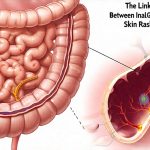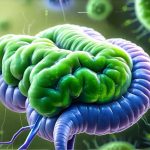Our gut is often called our “second brain” for good reason. It’s not just about digesting food; it profoundly impacts our overall health, from immunity and mental wellbeing to energy levels and even skin condition. A consistently poor diet can wreak havoc on this delicate ecosystem, leading to a cascade of uncomfortable symptoms and long-term health issues. Many people are unaware that seemingly minor dietary choices contribute significantly to gut imbalance. Recognizing the signs your gut is crying out for help is the first step towards restoring balance and improving your overall wellbeing. This article will explore the key indicators of a diet negatively affecting your gut, offering insights into how you can make positive changes.
The modern Western diet, often characterized by processed foods, sugar, and limited fiber, frequently puts immense strain on our digestive system. It disrupts the natural balance of bacteria in our gut microbiome – those trillions of microorganisms that play a vital role in health. When this balance is off, it’s known as dysbiosis, and can lead to a wide range of issues. Understanding these signs allows for proactive adjustments, paving the way for better digestive health and a stronger immune system.
Recognizing Gut Imbalance: Common Symptoms
A poorly functioning gut doesn’t always present with obvious symptoms like severe abdominal pain. Often, it manifests in more subtle ways that are easy to dismiss or attribute to other causes. One of the most common signs is bloating – not just after eating large meals, but frequently and for no apparent reason. This can be accompanied by excessive gas, belching, or a feeling of fullness even after consuming small portions. Frequent heartburn and acid reflux are also strong indicators that your gut isn’t happy; it suggests an imbalance in stomach acidity or issues with the esophageal sphincter.
Another key sign is changes in bowel habits. These could include diarrhea, constipation, or alternating between the two. The consistency of stool can also offer clues – frequent loose stools, hard-to-pass stools, or even mucus in the stool are all signs that something isn’t right. Beyond digestive symptoms, a compromised gut can manifest in unexpected ways. Skin issues like eczema, acne, or rashes can be linked to gut health, as can fatigue, brain fog, and mood swings. These seemingly unrelated symptoms often point back to an underlying imbalance within the digestive system.
The Role of Specific Dietary Culprits
Certain dietary components are particularly damaging to gut health. Highly processed foods, packed with artificial additives, preservatives, and unhealthy fats, disrupt the microbiome and can promote inflammation. Excessive sugar intake feeds harmful bacteria in the gut, leading to dysbiosis and potentially contributing to conditions like irritable bowel syndrome (IBS). Similarly, a diet lacking in fiber starves beneficial gut bacteria, hindering their growth and function. Fiber is crucial for maintaining a healthy digestive tract and promoting regularity.
Gluten, found in wheat, barley, and rye, can cause issues for individuals with gluten sensitivity or celiac disease, but even those without these conditions may experience bloating and discomfort from excessive gluten consumption. Dairy products, while nutritious for some, can also be problematic for others due to lactose intolerance or sensitivities. Identifying and minimizing these dietary culprits is essential for restoring gut health. This isn’t necessarily about complete elimination, but rather mindful reduction and replacement with healthier alternatives.
Impact of Food Intolerances & Allergies
Food intolerances differ from food allergies in that they don’t trigger an immediate immune response, but can still cause significant digestive distress. Identifying these sensitivities is key to easing gut discomfort. Common culprits include lactose (in dairy), fructose (in fruits and honey), and histamine (in fermented foods). An elimination diet – carefully removing potential triggers for a period of time and then reintroducing them one by one – can be an effective way to pinpoint problematic foods.
Food allergies, on the other hand, involve a more immediate immune response. Common allergens like gluten, soy, nuts, and shellfish can cause inflammation and damage to the gut lining, leading to symptoms ranging from hives and swelling to severe digestive upset. If you suspect a food allergy, proper medical testing is important for accurate diagnosis. Addressing both intolerances and allergies is paramount in creating a gut-friendly diet.
The Importance of Probiotics & Prebiotics
Probiotics are live microorganisms that provide health benefits when consumed; they essentially “repopulate” the good bacteria in your gut. You can find them in fermented foods like yogurt, kefir, sauerkraut, and kimchi, or take probiotic supplements. However, probiotics need a food source to thrive – this is where prebiotics come in. Prebiotics are types of fiber that feed beneficial gut bacteria. Good sources include onions, garlic, bananas, asparagus, and oats.
Combining both probiotics and prebiotics creates a synergistic effect, promoting a healthier and more diverse microbiome. This isn’t just about adding these foods to your diet; it’s about fostering an environment where good bacteria can flourish while minimizing the growth of harmful ones through dietary adjustments like reducing sugar and processed food intake.
Long-Term Consequences & Preventative Steps
Ignoring persistent gut issues can lead to more serious health problems down the line, including inflammatory bowel disease (IBD), autoimmune disorders, and even mental health conditions. A chronically inflamed gut can compromise nutrient absorption, weakening the immune system and increasing susceptibility to illness. The good news is that many gut-related problems are reversible with dietary changes and lifestyle adjustments.
Focusing on a whole foods diet rich in fiber, fruits, vegetables, lean protein, and healthy fats provides the building blocks for a healthy gut microbiome. Staying hydrated, managing stress levels, and getting regular exercise also play crucial roles in digestive health. Simple changes, like chewing food thoroughly and eating mindfully, can significantly improve digestion and reduce discomfort.
Ultimately, listening to your body’s signals is vital. Gut health is intricately linked to overall wellbeing, and addressing imbalances early on can prevent long-term complications and empower you to live a healthier, more vibrant life.


















